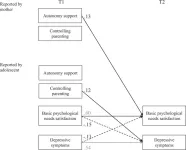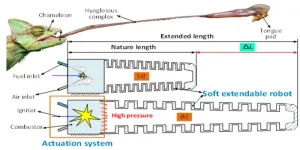(Press-News.org) Patients with ‘blinding’ headaches known as Idiopathic Intercranial Hypertension (IIH) could be treated with an injectable peptide used for type 2 diabetes, a new trial has found.
The study, published in the journal Brain, today reports on a phase two trial of a drug called exenatide, a GLP-1 receptor agonist, as a potential treatment for IIH.
The IIH Pressure Trial led by a team of neurologists from the University of Birmingham and University Hospitals Birmingham found that for the seven patients who received regular injections of the drug, currently approved for use in Type 2 Diabetes, led to a drop in pressure in the brain during both short (2.5hrs and 24hrs) and long term (12 weeks) measurements.
The trial also saw significant reductions in the numbers of headaches across the 12 weeks that participants took part, with an average of 7.7 fewer days per month of headaches compared to the baseline, compared to only 1.5 fewer days in the placebo arm.
Alex Sinclair is Professor of Neurology in the Institute of Metabolism and Systems Research at the University of Birmingham, an Honorary Consultant Neurologist at University Hospitals Birmingham NHS Foundation Trust, and Principal Investigator of the study. Professor Alex Sinclair said:
“This is a major trial for the rare and debilitating condition IIH that can lead to people, usually women, going blind and suffering disabling daily headaches. There are no current licenced drugs to treat IIH and hence this result is a major step forward for IIH patients.
“We are delighted to see that the phase two trial resulted in our treatment group having lower brain pressure both immediately and after 12 weeks and nearly 8 fewer headache days across the 12-week period, and that all the women were able to continue the treatment throughout with few adverse effects. We now hope to see a much larger trial of exenatide to literally ease the pressure for the many people around the world suffering with IIH.”
Shot in the arm for IIH treatment
Idiopathic Intracranial Hypertension (IIH) is a debilitating condition that raises pressure in the brain and can lead to chronic headaches and even permanent sight loss. The illness, which often leaves patients with a reduced quality of life, predominately affects women aged 25 to 36 and weight gain is a major risk factor of developing IIH and relapses of the disease.
Once regarded as rare, incidence of IIH is now rising dramatically in line with the global rise in obesity and there has been a 350 per cent rise in incidence in last 10 years. Currently there are no licenced drugs options and existing medications used off label are complicated by troublesome side effects.
A key finding was the rapid action of the drug, with results indicating that brain pressure was significantly reduced within two and half hours of taking the medication. This rapid onset of action is vital in a condition which can cause rapid blindness if left untreated.
Dr James Mitchell, Lecturer in Neurology at the University of Birmingham and first author of the paper said:
“The results of this clinical trial are a shot in the arm for finding clinical treatments for IIH. While we need to do further trials before such a treatment could be available for patients in the future, we are encouraged by the significant results from this trial that made a real difference for those in the treatment arm and this treatment may prove relevant for other conditions resulting in raised brain pressure.”
In this study the drug was given as a twice daily injection into the subcutaneous tissue. To reduce the need for frequent injection in the future a once weekly subcutaneous injection called Presendin will be trialled though University of Birmingham Start-up company, Invex Therapeutics.
Shelly Williamson, the Chair of patient charity IIH UK said:
“This is such exciting progress. New drug options is vitally important for IIH and this trial brings hope to the millions of patients living with the condition. We very much look forward to the next steps and seeing the drug tested in two large Phase 3 clinical trials.”
The IIH Advance is a Phase 3 clinical trial in Adolescents run in the UK, sponsored by the University of Birmingham and IIH Evolve is running in adults internationally sponsored by Invex Therapeutics. Ultimately the aim is to gain enough evidence to allow the drug to be licensed for use in IIH patients in the future.
END
New drug to lower brain pressure could treat blinding IIH headaches, trial finds
Phase two trial first study to show rapid and significant reduction in pressure in the brain and monthly headaches
2023-03-13
ELSE PRESS RELEASES FROM THIS DATE:
Links between maternal autonomy support and controlling parenting and adolescents’ depressive symptoms
2023-03-13
The relationship between adolescents and their parents has always been an intriguing issue in psychological research. Several studies underscore the significance of parenting behavior in the development of young people. Parental autonomy support, in particular, has been considered essential for adolescents’ growth and healthy functioning. Parental autonomy support and controlling parenting are the two most important facets of parenting. The former refers to parents supporting the independence of their children, including listening carefully, providing choices, perspective-taking, and offering valid reasoning for particular behaviors. On the contrary, controlling parenting refers to parental ...
Organosulfur content of vegetables quantified
2023-03-13
Osaka, Japan – The health-promoting effects of sulfur-rich vegetables such as onions and garlic have been known for a long time. How food containing sulfur compounds promotes health has not been easy to explore, as the levels—and types—of reactive polysulfides found in different vegetables had not been accurately measured.
A research team, led by Assistant Professor Shingo Kasamatsu from the Osaka Metropolitan University Graduate School of Science, has established a method for selective and sensitive detection of reactive ...
Scientists to examine whether SARS-CoV-2 infection during pregnancy affects a child’s risk for neurodevelopmental disorders
2023-03-13
BALTIMORE, Md. (March 13, 2023) – Scientists led by the Lieber Institute for Brain Development are studying how a mother’s SARS-CoV-2 infection during pregnancy affects the biology of the placenta and the corresponding trajectory of the child’s brain development, including the risk for neurodevelopmental disorders such as schizophrenia and autism. The work is made possible by a $3 million, five-year grant from the Eunice Kennedy Shriver National Institute of Child Health & Human Development, part ...
How new multi-sport facilities can be used after major events
2023-03-13
Communities that are constructing new multi-sport facilities for major events could run the risk of ending up with expensive under-used complexes, but a new study suggests there are several factors that can keep them productive in the long run.
Researchers found that factors such as the location and design of the facility, the formal agreements between operating groups and the breadth of sport and recreation programming offered at the facility all contributed to promoting a legacy of participation post-event.
“Major sporting ...
New technique reduces postoperative complications in prostate cancer surgery
2023-03-12
Surgeons in Germany have shown a small technical change to keyhole surgery for prostate cancer can more than halve one of the most common post-operative complications – where lymphatic fluid collects in the pelvis.
The technique involves creating a small flap in the peritoneum – the lining of the abdomen – and attaching this flap down into the pelvis. This creates a route for lymphatic fluid to escape from the pelvis into the abdomen where it can be more easily absorbed.
The findings ...
UK study finds vasectomies are even safer than reported
2023-03-12
Vasectomies are much less likely to cause complications than expected, according to a new UK study reviewing the outcomes from over 90,000 vasectomies performed over 15 years.
The study, led by researchers from Gloucestershire Hospitals NHS Foundation Trust, is being presented today at the European Association of Urology (EAU) Congress in Milan.
It shows that existing leaflets explaining the potential complications to patients are based on outdated figures.
Around 11,000 vasectomy operations are performed every year ...
Difference between “growers” and “showers” revealed
2023-03-12
A scientific definition to determine whether a man’s erection can be deemed a "grower " or a "shower" has been produced by researchers.
The findings are presented today at the European Association of Urology (EAU) Congress in Milan.
Urologists based at three hospitals and a clinic in Madrid conducted ultrasound scans on 225 men in both flaccid and then erect states.
The researchers, led by Dr Manuel Alonso-Isa, a urologist at the University Hospital HM Puerta del Sur in Madrid, Spain, had hoped to find factors among the men that would predict if they fell into one of these ...
Delaying treatment for localised prostate cancer does not increase mortality risk, trial shows
2023-03-12
Active monitoring of prostate cancer has the same high survival rates after 15 years as radiotherapy or surgery, reports the largest study of its kind today.
The latest findings from the ProtecT trial, led by the Universities of Oxford and Bristol, are presented today at the European Association of Urology (EAU) Congress in Milan and published in the New England Journal of Medicine.
The trial was funded by the National Institute for Health and Care Research (NIHR).
Although men on active monitoring – which involves regular tests to check on the cancer – were more likely to see it progress ...
Clinical trial shows wrist device significantly reduces tics in Tourette syndrome
2023-03-12
The results of the clinical trial of a new wrist device designed to help control the symptoms of Tourette syndrome have shown it significantly reduces the severity and frequency of tics.
The prototype wrist device, which was recently tried out by Lewis Capaldi, delivers electrical pulses to reduce the amount and severity of tics experienced by individuals with Tourette’s and was trialed by 121 people across the UK. The results have been announced in MedRxive.
The device has been developed by scientists at the University of Nottingham and spin-out company Neurotherapuetics Ltd who have recently secured £1m in additional funding to ...
Design of a fuel explosion-based chameleon-like soft robot aided by the comprehensive dynamic model
2023-03-11
A research paper by scientists at the Beijing Institute of Technology and University of Lancaster displayed a recent advancement of using fuel explosion as the power of source to achieve the rapid and powerful motion for the medium-size robots.
The new research paper, published in the journal Cyborg and Bionic Systems, provided a new kind of actuation system for the robotic system, providing a promising patentability to largely improve the working length of the conventional medium-size robotic systems.
“Achieving the rapid and fast motion of the medium-size robot has been a challenging task for many years, …” ...
LAST 30 PRESS RELEASES:
ASU researchers to lead AAAS panel on water insecurity in the United States
ASU professor Anne Stone to present at AAAS Conference in Phoenix on ancient origins of modern disease
Proposals for exploring viruses and skin as the next experimental quantum frontiers share US$30,000 science award
ASU researchers showcase scalable tech solutions for older adults living alone with cognitive decline at AAAS 2026
Scientists identify smooth regional trends in fruit fly survival strategies
Antipathy toward snakes? Your parents likely talked you into that at an early age
Sylvester Cancer Tip Sheet for Feb. 2026
Online exposure to medical misinformation concentrated among older adults
Telehealth improves access to genetic services for adult survivors of childhood cancers
Outdated mortality benchmarks risk missing early signs of famine and delay recognizing mass starvation
Newly discovered bacterium converts carbon dioxide into chemicals using electricity
Flipping and reversing mini-proteins could improve disease treatment
Scientists reveal major hidden source of atmospheric nitrogen pollution in fragile lake basin
Biochar emerges as a powerful tool for soil carbon neutrality and climate mitigation
Tiny cell messengers show big promise for safer protein and gene delivery
AMS releases statement regarding the decision to rescind EPA’s 2009 Endangerment Finding
Parents’ alcohol and drug use influences their children’s consumption, research shows
Modular assembly of chiral nitrogen-bridged rings achieved by palladium-catalyzed diastereoselective and enantioselective cascade cyclization reactions
Promoting civic engagement
AMS Science Preview: Hurricane slowdown, school snow days
Deforestation in the Amazon raises the surface temperature by 3 °C during the dry season
Model more accurately maps the impact of frost on corn crops
How did humans develop sharp vision? Lab-grown retinas show likely answer
Sour grapes? Taste, experience of sour foods depends on individual consumer
At AAAS, professor Krystal Tsosie argues the future of science must be Indigenous-led
From the lab to the living room: Decoding Parkinson’s patients movements in the real world
Research advances in porous materials, as highlighted in the 2025 Nobel Prize in Chemistry
Sally C. Morton, executive vice president of ASU Knowledge Enterprise, presents a bold and practical framework for moving research from discovery to real-world impact
Biochemical parameters in patients with diabetic nephropathy versus individuals with diabetes alone, non-diabetic nephropathy, and healthy controls
Muscular strength and mortality in women ages 63 to 99
[Press-News.org] New drug to lower brain pressure could treat blinding IIH headaches, trial findsPhase two trial first study to show rapid and significant reduction in pressure in the brain and monthly headaches



